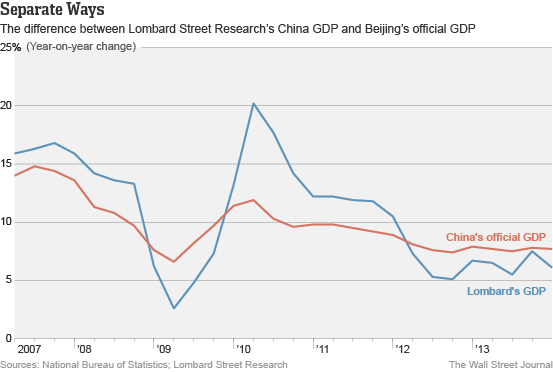Many claim that China manipulates its economic data. We explain why the best way not to get caught is to lower the GDP deflator, as lower inflation helps to increase real GDP. Lombard Street Research assumes that Chinese officials followed that approach.
Standard Chartered economist Stephen Green has said that China’s official GDP figures were boosted by government statisticians underestimating inflation, which results in an overestimate of actual growth. And the New York Times recently discovered that some Chinese power plant managers were inflating output figures to hide the extent of a big slowdown in usage from the central government.
The best way to push real GDP upwards is, hence, to understate inflation via the GDP deflator. Lombard Street Research assumes that Chinese officials followed that approach:
Lombard Street Research claims that China’s inflation is understated
Lombard Street Research, a London economic research firm that takes a bearish view on China, constructs its own version of the country’s GDP. Lombard’s conclusion: China’s economy grew just 6.1% in the fourth quarter of 2013, year-over-year, down from 7.5% the previous quarter. That compares with the 7.7% fourth-quarter increase reported by China’s statistics bureau, which was down a smidgen from 7.8% in the third quarter.
The main difference between Lombard’s numbers and the official numbers, said Lombard economist Diana Choyleva, is the estimation of China’s inflation. GDP is reported in real—that is, inflation adjusted — terms. If China’s inflation is higher than reported, its GDP growth will be lower.
Ms. Choyleva said that China doesn’t release enough information to get a good grasp on how it constructs the inflation measure, called the GDP deflator. She said she puts together her GDP deflator based on various weights she gives to prices of such variables as consumer goods, imports, exports and investment.
The Lombard data don’t always produce a lower estimate of GDP than China’s government. During the first quarter of 2010, for instance, Lombard estimated that China’s GDP grew 20.2%, year over year, compared to the official tally of 11.9%. Indeed, one of the reasons for skepticism about China’s growth is that GDP seems to move up and down smoothly, which is unusual for any country, especially a developing one.
China’s leaders “are very concerned about stability,” said Ms. Choyleva. “They worry about social instability through slow growth and also through inflation,” which could result from very fast GDP growth.
The National Bureau of Statistics didn’t respond to a request for comment.
Chinese Premier Li Keqiang is among the skeptics of China’s GDP numbers. In 2007, he told the U.S. ambassador that GDP is a “man-made and therefore unreliable” statistic.
Mr. Li, who was then Communist Party chief of Liaoning province, said he looked at stats on electricity, rail cargo and loans to get a better gauge of economic activity, according to a copy of the ambassador’s memo, which was made public by WikiLeaks.
At least since then, others have come up with different ways of looking at Chinese output. Capital Economics, a London research firm, publishes a monthly China Activity Proxy, which measures electricity output, freight shipment, floor space under construction, passenger travel and cargo volume.
Mark Williams, a Capital Economics analyst, said that he doesn’t yet have data on seaport cargo volumes, so the proxy numbers aren’t final. But preliminary figures suggest that China’s GDP growth slowed to 6.4% in the fourth quarter, year over year, from 6.8% in the third quarter—again, a much lower estimate of growth than China’s official numbers present.
“That said, China is still growing rapidly on our estimates,” said Mr. Williams. “If you compare China to other emerging economies today and through the last 20 or 30 years, it’s still a strong performer.”

















1 comments
Cash The Locksmith
2016-06-22 at 13:21 (UTC 2) Link to this comment
Thanks for reminding